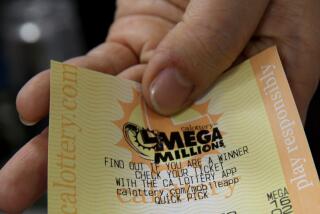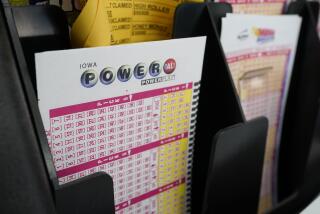Lottery Vendors Do Their Number, Hope to Cash In
SACRAMENTO — “Hello,” said the machine in a voice that sounded like someone gargling, “I am the Lottery Exchange. I can help you purchase tickets. . . .”
The machine went on to tell a customer to give it either a one- or a five-dollar bill and to select a number on its video screen. Then it dispensed a lottery ticket and gargled, “Thank you and good luck.”
The machine was one of a dozen such displays in Sacramento this week at the New Lottery States Seminar and Exhibit.
The seminar, put on by the Public Gaming Research Institute, brought together lottery officials from all over the country to discuss methods and problems in setting up new lotteries. It also gave entrepreneurs from across the nation a chance to showcase some of the latest lottery gadgetry and to make pitches for a share of the bounty when California’s state lottery begins later this year.
With predictions of the yearly gross running as high as $2 billion, California’s lottery is considered the sweetest plum in the country by companies that provide such lottery services as games and tickets.
It is unclear whether the California law prohibiting slot machines will also ban cash-operated lottery devices. But suppliers of such devices are betting that if the machines are not already lawful the Legislature will soon make them legal.
The talking Lottery Exchange machine is made by Syntech International Inc. of Dallas, which has placed 700 of the devices in New York and plans to put another 100 in Ohio, according to Gordon T. Graves, chief executive officer of the company.
Graves says Syntech gets about 8% of the take from the New York machines and will get 11% from those in Ohio.
“We were concerned,” Graves said of the machine, “that it would be intimidating to potential users.”
Then, as the machine gargled a greeting, he added, “This thing, we think, is really friendly.”
But for state of the lottery art, argues Philip King, what California needs is the VAULT--that is a Videoscreen Activated User Lottery Terminal--made by Electro-Sport Inc. of Costa Mesa.
“There is absolutely no comparison from any machine out there now,” King said as he pointed to where coins are dropped into the VAULT to activate it.
It is expected that California will begin its lottery with simple scratch-off, instant-pay tickets and later phase in the more sophisticated numbers games.
But King is not discouraged:
“Why start with an archaic ticket system when you can start with the future now?”
The VAULT, King insists, is ready for operation and cannot be rigged by crooks:
“It is absolutely impossible to molest this machine in any way.”
King started the machine and began selecting numbers on the colorful screen as the device played a tune that sounded like computer bubbles bursting. But it didn’t talk.
At a nearby display, Astro Otto solves the problem of veteran lottery players who are tired of picking numbers to bet on.
“One of the problems with the lottery is it is boring to pick the numbers,” said Ken Anderson, vice president of marketing with Destron, a Chicago-based firm.
Destron has solved that problem with Astro Otto. Customers feed Otto their birthdates and a quarter and Otto gives each of them a list of eight lucky numbers.
Astro Otto doesn’t pay off itself, Anderson explained, but it is good for lottery business because it encourages its customers to place at least eight lottery bets each time they play Astro Otto.
“We come up with eight numbers,” Anderson told a meeting jammed with lottery officials and suppliers. “They (Astro Otto’s customers) were going to play two. They wind up playing eight, so it increases your take a little bit.”
Later, Anderson stood beaming in front of an Astro Otto that was illustrated with strange creatures and flying dollars.
“I’m just here prospecting to see what kind of interest it might generate,” he said, grinning. “I’m here to help.”
More to Read
Inside the business of entertainment
The Wide Shot brings you news, analysis and insights on everything from streaming wars to production — and what it all means for the future.
You may occasionally receive promotional content from the Los Angeles Times.










